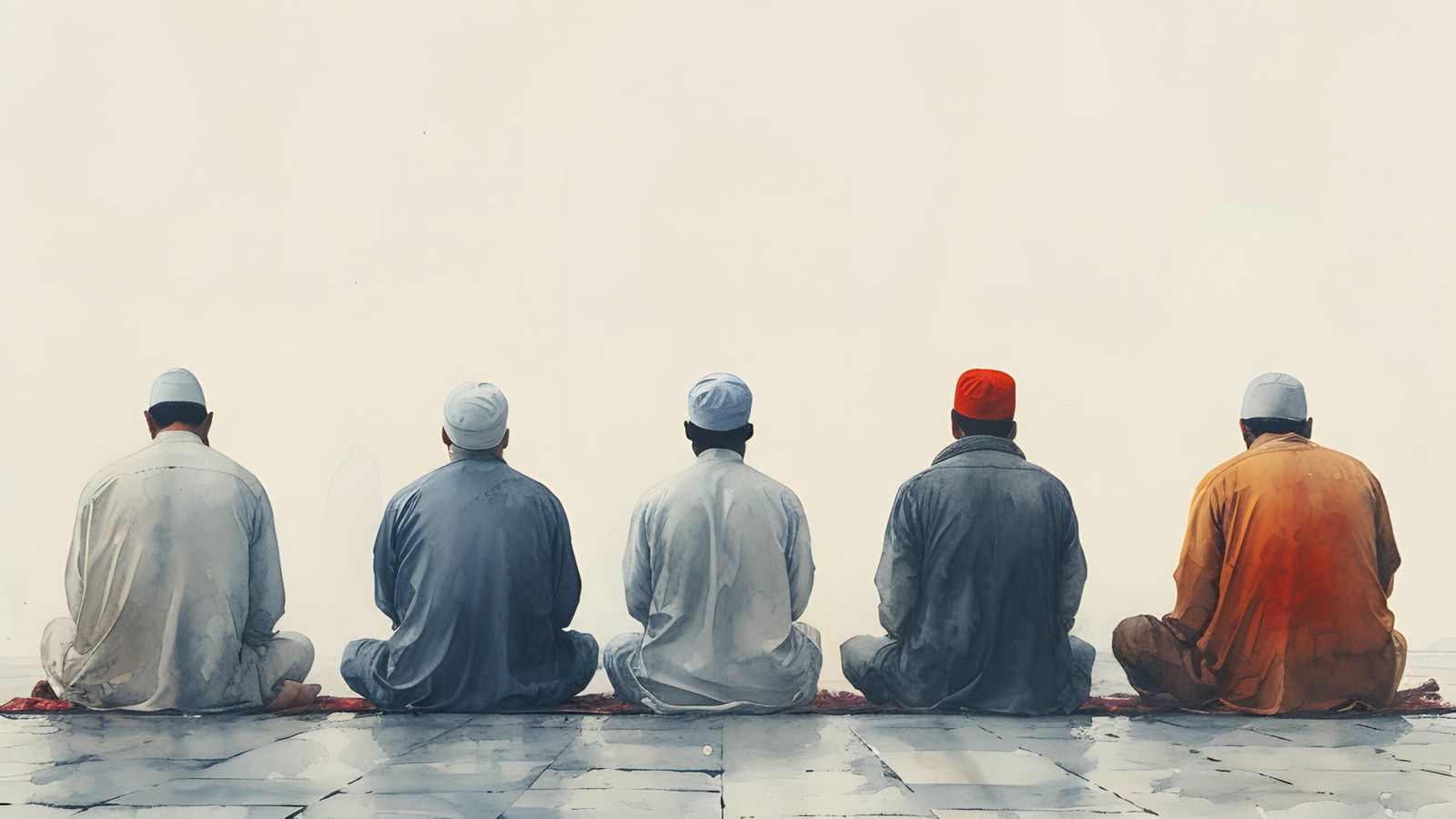Advice on How to Navigate Mixed Family Gatherings
Imām Muḥammad ibn Ṣāliḥ al-ʿUthaymīn


Interacting with Non-Maḥram Relatives by Marriage
[Q]: It is customary in the south to refer to the wife of your uncles (i.e. your mother’s brother’s wife or father’s brother’s wife) as one’s ‘aunty’. In doing so, they subsequently view it permissible for her to display herself at gatherings (as if she is a blood relative). She frequently comes to welcome others to her home without touching the guests. Her age exceeds forty years. She will come to the door and welcome guests, displaying herself. What is your opinion on this?
[A]: Our opinion is that any woman displaying herself to anyone other than her maḥram is a mistake. The wives of one’s uncle or brother are not maḥram. As for one’s daughter-in-law or stepmother, they are both maḥram. It is obligatory that our customs are subjected to Islamic legislation.
Therefore, It is obligatory that he averts his gaze from her and advises her regarding this by saying: “Indeed, this is impermissible”. If she acts in accordance with the proffered advice, then this is most desirable. If she chooses not to, then let him avert his gaze from her. If she is not from among his blood relatives, he should not be in her company.1
Family Members Socialising in Groups Including Non-Maḥram Women
[Q]: I live in a family in which the men gather with (non maḥram) women, laughing and joking together, all the while, the women do not observe the ḥijāb [covering the hair and dressing modestly]. In the past, I asked about this and was told that this is impermissible, and that I should not attend such gatherings, nor should I participate in any way, even to partake in a meal. This is the cause of much consternation and anxiety for me because, as a result, during their gatherings I spend that time in my room by myself. So what do you advise me with—may Allāh reward you?
[A]: Firstly, my advice to you and everyone like you who is similarly experiencing this is to have taqwá of Allāh—the Exalted in Might—to the very extent of your abilities as the Most High said:
فَاتَّقُوا اللَّهَ مَا اسْتَطَعْتُمْ
“So keep your duty to Allāh and fear Him as much as you can.”
(Al-Taghābun, 64:16)
Secondly, advise and exhort them with fair, excellent preaching. For Allāh may guide them using the hands of a human being.
Thirdly, a person should be fully aware and well-versed in the matters of difference among the scholars for which the opposition possesses no definitive, unanswerable evidence. Moreover, it is impermissible for any person to obligate upon another his own view in any matter, seeking to transform their views. As long as a particular issue is one of scholarly difference for which there exists no definitive proof, then to each person belongs their opinion based on scholarly strife. So abandon the people to follow their scholarly strife and their accounts will be with Allāh—the Exalted in Might. For example, if this woman lives in a community that views it permissible for a woman to uncover her face even before those who are not among her maḥrams or husband, then she is not obligated to force them to adopt her own view regarding the obligation of veiling one’s face. Just as it is impermissible for her to obligate this upon them. However, she may debate and argue with them in this issue such that all of them are able to fully adopt what has been stipulated by legislative evidence.2
A Woman Uncovering In Front of Her Brother-in-Law and Greeting Him
[Q]: What is your opinion on women that do not observe the ḥijāb, especially in our circumstance of rural life where there is free-mixing in the house with in-laws and other close relatives. For example, is it permissible for a woman to greet her brother-in-law if he returns from travel, or on certain special occasions like ʿĪd and other than it? Benefit us with your answer—may Allāh reward you.
[A]: It is obligatory that all our communities are Islamic in nature. This is achieved by looking at the manner, conduct and behaviour of the pious predecessors and emulating it. As the Prophet (صلى الله عليه وسلم) said: “The best of all generations is my generation, then those after them, then those after them”.3 The Prophet (صلى الله عليه وسلم) made this statement to encourage his ummah to follow that generation which is the best of all generations.
As for innovative customs which were introduced afterwards, these must be measured and compared to that which is in the Book of Allāh and the Sunnah of His Messenger (صلى الله عليه وسلم). Whatever custom or practice opposes that which is in the Book of Allāh or the Sunnah of His Messenger (صلى الله عليه وسلم) should be completely abandoned, relegated and distanced away from us. As for customs that are either in agreement with it or do not oppose it, then there is nothing wrong with adoption of such practices.
As for the situation being referred to by the one posing the question, regarding a community that pays no care and attention to these matters—to the extent that male and female cousins touch one another in greetings when returning from travel or when leaving one another—this represents a contemptible practice that opposes legislation. For it is impermissible for a man to touch a woman in greeting who is not from among his maḥrams. In this act there is danger, just as it breeds societal discord, dissension, and engagement in obscenities.
A person also should not make excuses saying: “I am a close relative” or “I am safe from such matters” or similar statements. This is a matter that is most deserving of caution as the companions (رضي الله عنهم) asked the Prophet (صلى الله عليه وسلم) about one’s in-laws, to which the Prophet (صلى الله عليه وسلم) replied: “I caution you from entering upon [strange] women.” The companions said: “O Messenger of Allāh! Regarding [a woman’s] in-laws?”. He (صلى الله عليه وسلم) answered: “In-laws are akin to death”.4 That is, one must be wary of them in the same way as death. The reason for this is that one’s in-laws freely enter the houses of their brothers, uncles and relatives without objection. He himself is completely comfortable, unafraid [of falling into ḥarām]. Such a circumstance breeds danger and societal discord. For this reason, the Prophet (صلى الله عليه وسلم) warned against him saying: “In-laws are akin to death”.5
Endnotes:
[1] Source: Liqāʾ al-Bāb al-Maftūḥ 33:117.
[2] Source: Fatāwá Nūr ʿalá al-Darb 2: 22.
[3] Authentic: narrated by Muslim: 6561
[4] Authentic: Narrated by al-Bukhārī: 5232 and Muslim: 2172.
[5] Source: Fatāwá Nūr ʿalá al-Darb 2: 22.
Translated by: Riyāḍ al-Kanadī
Most Popular: Last 30 Days

















